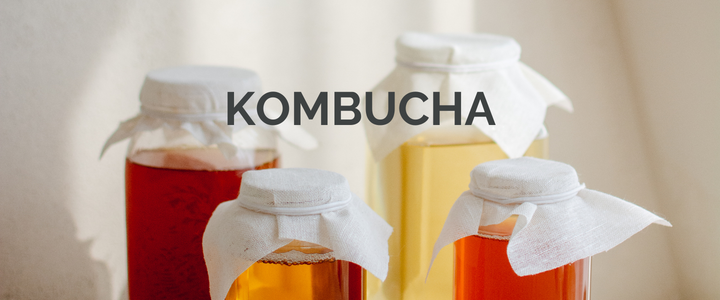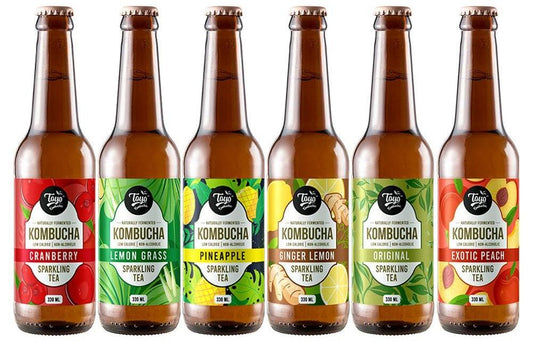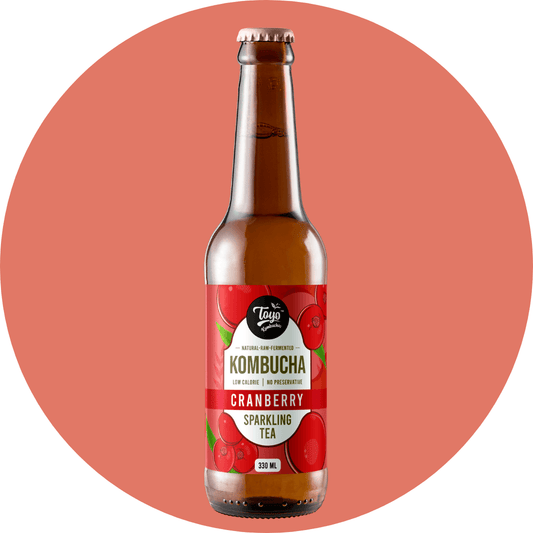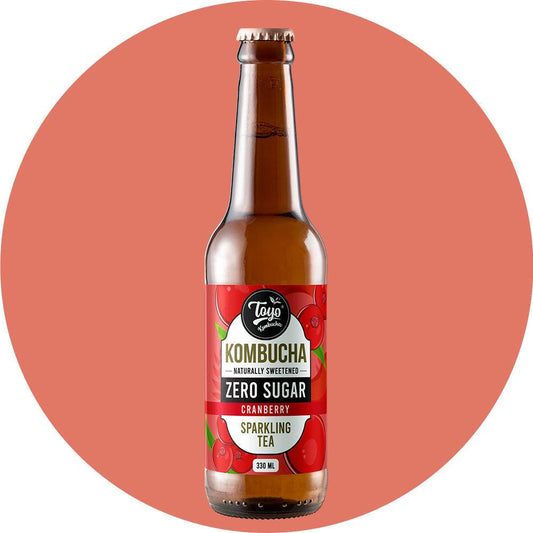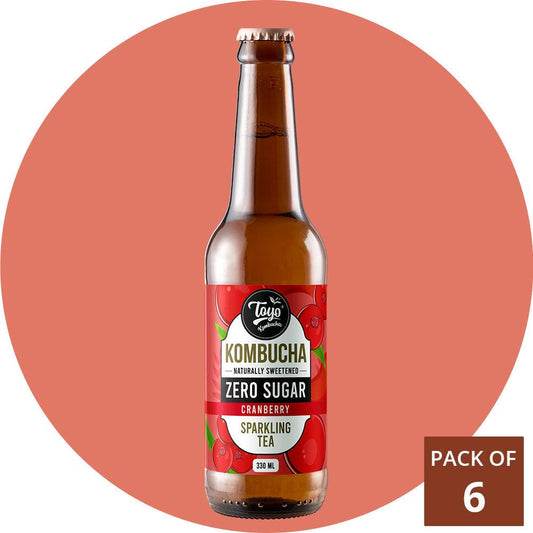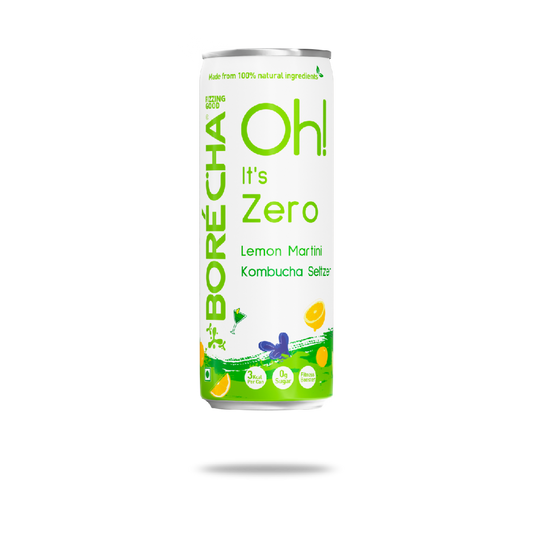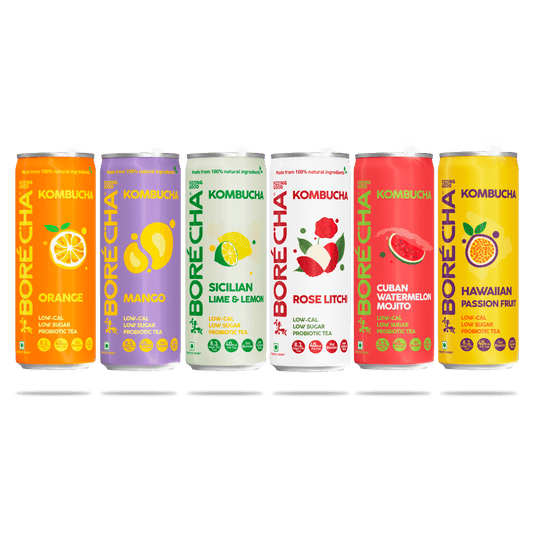Kombucha has gained significant popularity in recent years as a refreshing and healthful beverage. It is a fermented drink known for its unique flavor and potential health benefits. The word "kombucha" originates from Japanese, but it is believed to have ancient roots in China. In Japanese, "kombucha" translates to "kelp tea," although it is not related to seaweed. Kombucha is sometimes referred to as "mushroom tea" due to the appearance of the SCOBY, which can resemble a mushroom cap. Here, we will explore how kombucha is made, its nutritional value, the benefits of drinking kombucha, and provide a simple recipe for making kombucha at home. How is Kombucha Made? Kombucha is made through the fermentation of sweetened tea. The process involves combining tea, usually black or green tea, with sugar and a symbiotic culture of bacteria and yeast (SCOBY). The SCOBY consumes the sugar and converts it into various beneficial compounds, including organic acids, vitamins, enzymes, and probiotics. The fermentation process typically takes around one to two weeks, during which the kombucha develops its characteristic tangy flavor and effervescence. Benefits of Drinking Kombucha: Probiotics: Kombucha is a natural source of probiotics, which are beneficial bacteria that support a healthy gut microbiome. Probiotics promote digestion, boost immunity, and may improve overall gut health. Antioxidants: Kombucha contains antioxidants that help protect the body against oxidative stress and reduce inflammation. These antioxidants, such as polyphenols, can potentially contribute to the prevention of chronic diseases. Detoxification: The organic acids present in kombucha, such as acetic acid and glucuronic acid, aid in detoxification by supporting liver function and assisting in the removal of toxins from the body. Improved Digestion: The fermentation process of kombucha produces enzymes that assist in breaking down food and aiding digestion. This can help alleviate digestive issues like bloating and indigestion. Nutritional Value of Kombucha: Kombucha is a low-calorie beverage that contains several important nutrients. While the exact nutritional composition may vary depending on the specific recipe and fermentation time, kombucha is generally a good source of B vitamins, such as B1, B2, B6, and B12. It also contains small amounts of minerals like potassium, magnesium, and calcium. The nutritional value of kombucha can vary depending on the specific brand and recipe. However, here is a general breakdown of the approximate nutritional values for 100 grams of typical kombucha: Calories: 15-30 Total Carbohydrates: 2-8 grams Sugars: 0-5 grams Dietary Fiber: 0-3 grams Protein: 0-1 gram Fat: 0 grams Sodium: 0-10 milligrams Vitamin C: 0-5 milligrams B vitamins (B1, B2, B3, B6, B9, B12): Small amounts present Acetic Acid: Varies depending on fermentation, typically low levels Kombucha Recipe: Making kombucha at home is relatively simple, but it requires some patience and care. Here's a basic recipe to get you started: Ingredients: 3 liters of water 4-5 tea bags (black or green tea) 200 grams of sugar 1 SCOBY (symbiotic culture of bacteria and yeast) 200 ml of starter liquid (previously brewed kombucha) Instructions: Boil the water and remove it from heat. Add the tea bags and let them steep for about 10-15 minutes. Remove the tea bags and stir in the sugar until it dissolves completely. Allow the sweetened tea to cool to room temperature. Pour the cooled tea into a clean glass container, leaving some headspace. Add the SCOBY and the starter liquid to the container. Cover the container with a clean cloth or coffee filter secured with a rubber band. This allows airflow while keeping out dust and insects. Place the container in a warm, dark location away from direct sunlight and let it ferment for 7-14 days. The longer the fermentation, the more tart and less sweet the kombucha will become. Once the desired flavor is achieved, carefully remove the SCOBY and store it in some of the finished kombuchas as a starter for your next batch. Transfer the remaining kombucha into bottles and refrigerate to slow down fermentation. It is now ready to be consumed. Conclusion: Kombucha is a fermented tea beverage that offers a range of potential health benefits. With its probiotics, antioxidants, and detoxifying properties, kombucha can be a refreshing and nutritious addition to your daily routine. By following a simple recipe, you can make your own kombucha at home and enjoy the delightful flavors and potential health perks it has to offer. Mini collection Probiotics: Probiotics are beneficial bacteria that promote a healthy gut microbiome. They support digestion, boost immunity, and may reduce the risk of certain gastrointestinal issues. Consuming probiotics through foods like yogurt, kefir, and fermented vegetables can help maintain a balanced gut flora and contribute to overall well-being. Healthy Drinks: Healthy drinks are essential for maintaining hydration and supporting overall health. Water is the top choice, providing hydration without any added calories or sugar. Other healthy options include herbal teas, green tea, fresh vegetable juices, and homemade smoothies with natural ingredients. Avoiding sugary sodas and excessive caffeine is important for optimal health.


